I spoke at length earlier in the week about the fantastic street food options that are on offer in South Korea, but there's a world of flavors inside as well. From the signature bulgogi to more exotic items such as ddok galbi and the infamous boshintong (dog soup) - there's something for most every palette in the Land of the Morning Calm.
When people think of Korean cuisine they generally think of either kimchi (spicy fermented cabbage) or bulgogi, which is a marinated beef usually cooked BBQ style but used in everything from pizza to hamburgers. I've tried it in both its traditional BBQed form and in a kind of stew that was poured over rice. The last of these tries were done at Everland though, so I doubt it was an authentic representation of the dish.
NB: Kimchi comes in a variety of forms based around different vegetables including cucumber and radish. It can be 'old' or 'new', which greatly influences its taste. When I saw kimchi here I literally mean the generic cabbage variety. Just to avoid confusion.
When it comes to eating meat, Koreans don't really do meals without it. And while most Korean children make do with kimchi and rice for at least two meals a day, the remaining meal will have some kind of fleshy accompaniment - even if it is just canned ham or a pitiable little piece of fish.
My personal preference when it comes to dark meat is either galbi (BBQed beef served rolled up in lettuce leaves) or seomgyeopsal (the same again, but with pork in place of beef). It's not a meal in Korea without dozens of sides accompanying the main course, and these usually include kimchi, coleslaw with some kind of odd sauce, pickles, and if you're lucky, a rare treat such as boiled quail eggs or delightfully soft baked potatoes.
Eating in Korea is a communal thing, and galbi and seomgyeopsal are both cooked on a hot-plate in the center of the table and eaten from it. You use chopsticks to pluck up a piece of meat and place it into a leaf (usually lettuce, but occasionally sesame) alongside any other accompaniments you wish to throw in. I generally use samjjang (a mild bean paste), a sliver of garlic, and some kind of spicy vegetable. Others prefer to use gochujang (a spicy pepper paste) for a little extra kick.
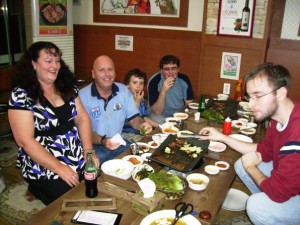
My family enjoying their first galbi on a visit to Gwangju in 2008
Washed down with some local beer or some soju, galbi and seomgyeopsal are both cheap and surprisingly filling options when you're out and about. They're a sit down meal, so don't expect to be in and out quickly, and you can always splash out on marinated options if you're feeling a bit special.
Sharing a name with galbi is ddok galbi, which bears no real resemblance to the beef dish. Made with chicken, ddok (chewy rice cakes), and plenty of spice - ddok galbi is traditionally eaten with either noodles or rice. The noodle version does tend to run a lot hotter, and I've only ever eaten it folded in leaves. The rice version, which I've had plenty of this year, is typically just eaten straight from the wok with a spoon. It's fantastic with a little cheese mixed in as well. My personal favorite when it comes to Korean cuisine.
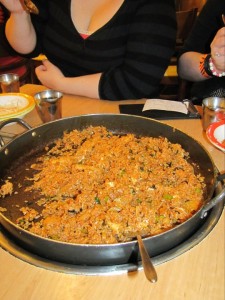
Amazing, amazing ddok galbi eaten in Nampodong, Busan
Another meat offering is the more Western 'dankas', which is essentially a breaded pork cutlet served with a side salad and BBQ sauce. There is also a cheesy dankas, which has a layer of cheese between the pork and the bread-crumbs. Neither of them are healthy or particularly Korean, but are usually available as a takeout meal.
Not feeling meat? There's other options on the menu.
Shabu Shabu, a dish borrowed from the Japanese, is a hearty soup packed full of thick noodles, vegetables, and a little meat if you so desire. Eaten communally and often poured over rice (as many Korean soups are) - it's great on a chilly night and is remarkably filling. I had shabu shabu on both my first and last nights out in Korea during my first tour of duty, so it's always going to hold a special place in my heart.
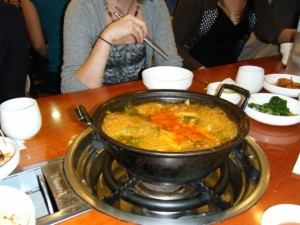
Shabu Shabu!
Another soup option that springs to mind is kimchi jjigae, a broth made from kimchi. It lacks the spiciness and distinctly fishy taste of kimchi, with a more tomato based recipe making it easier on foreign palettes. There's also chamchi jjigae, which is essentially the same thing served up with chunks of tuna in the mix for that little extra protein. There are other jjigae options but I've not ventured far afield in this particular area. Of course, boshintong is a soup made from dog that is occasionally available. I have no qualm with eating dog, but the way the animals are killed does put me off ever sampling this particular dish.
If you're ever feeling a nasty hangover, there's also a famous local soup that the natives swear will ward it off. The name of it escapes me, and I've not had it in over two years, but it's based around beef spine and is remarkably spicy. It'll burn a hangover out of you before it's had a chance to cause you any heart-ache.
On the ricier side of things are bibimbap (literally mixed rice), bocumbop (fried rice), albop (rice with fish eggs), gimbap (seaweed rice wraps), and various variants on the traditional white rice. Bibimbap is a great and pretty healthy options - mixing rice with various vegetables, a fried or raw egg, and plenty of the spicy pepper paste. When served with a raw egg it will come in a hot bowl (called dolsot bibimbap) in which the egg literally cooks itself as you stir it through the rice. Definitely my preferred method of intake.
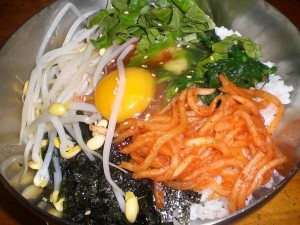
Possibly the worst bibimbap I ever had, but also the only photo I've ever taken of it. Sorry!
Albop is along the same lines, but instead of an egg and vegetables - you instead have various kinds of seaweed and liberal lashings of roe (fish eggs) to flavor the dish. I am in love with this particularly specialty.
Gimbop, akin to a Japanese sushi roll but with key differences, is an easy to find snack. When it's made well it is quite good - but the vast majority of gimbop foreigners will eat will either come from 'fast food' Korean restaurants like Gimbop Nara or Gimbop Jongu, or it will be bought cold in 7/11s and other convenience stores. It also comes in triangle form which I find is a better option. Hard as hell to unwrap though.
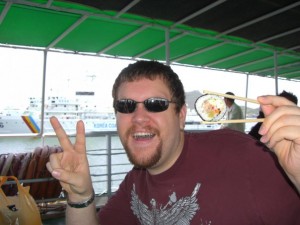
My friend Cody enjoying some chamchi (tuna) gimbop on the ferry to Oaedaldo in 2009
Not feeling rice? Mandu is a dumpling filled with kimchi, beef, noodles, or a combination of the three. You can buy it cheaply in bulk at most supermarkets and cook it at home, but it's also available in most restaurants for very little. There's a deep fried variant out there for when you're hungover, but I prefer it in its less heart-attack inducing form.
Vegetarians might also consider pajjang, a pancake made with vegetables and squid - although this last can be taken out for the true vegetarians. You can get it with other ingredients, and the Cave Bar in Beomil, Busan serves up a brilliant seafood kimchi pajjang that is worth a try. Wash it down with makkali and you won't regret it, I promise.
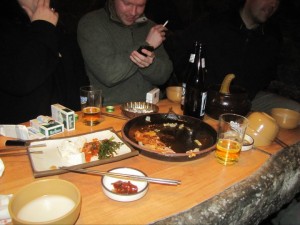
Pajang. So good it didn't survive long enough to photograph.
It's easy to fall into the trap of subsisting on a diet of Paris Baguette, Dunken Donuts, McDonalds, and 7/11 food when you're in Korea - but there's so much delicious local flavor out there that it would be a crime to stay in. Hell, I haven't even touched on Korean seafood - of which there is a massive selection. It is, sadly, not my area of interest. I will say that BBQed eel served up galbi style is a highlight of any coastal visit though.
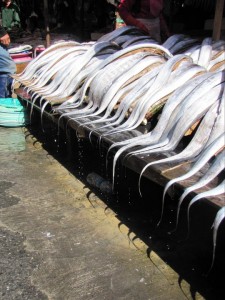
Fish baking out in the sun at Jagalchi Fish Markets in Busan. One of the reasons I don't eat Korean seafood.
All of this typing is making me hungry. Off to eat some of the decidedly un-Korean food I just cooked for myself. Black bean and lentil burritos! I'm such a hypocrite.




































 RSS Feed
RSS Feed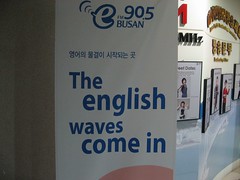


Recent comments